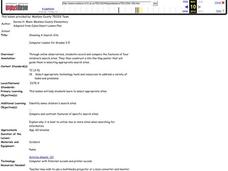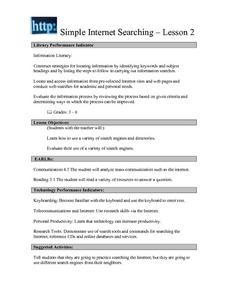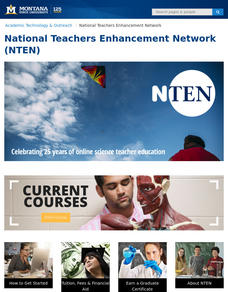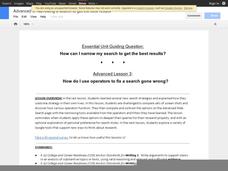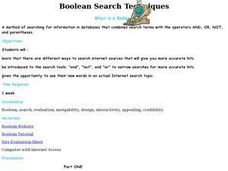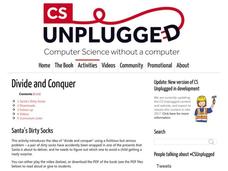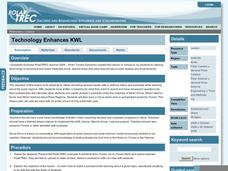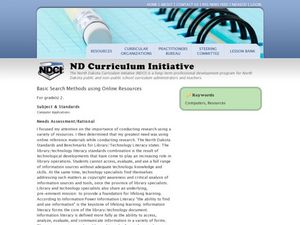Curated OER
Choosing A Search Site
Computer savvy kids construct a lift-the-flap poster to aid them in selecting appropriate search sites for research and information gathering. Through online observations, they record and compare the features of four children's search...
Education World
Use Boolean Search Terms to Shorten Web Searches
Have you ever conducted a Web search and received too many hits? Teach your class about Boolean search terms and provide them time to practice conducting efficient online searches. This lesson plan contains several fun activities which...
Beauty and Joy of Computing
Search Engines
Which search engine is best? The last lab in a unit of five leads the class to investigate search engines. Working in groups, individuals read and discuss articles related to searching the Internet. Pupils develop suggestions that...
Teaching Tolerance
Understanding Online Searches
Discover what's behind an online search. Scholars read a handout and engage in discussions to learn how to critically evaluate online search results. Then, working in small groups, they create posters listing their demands for search...
TryEngineering
Search Engines
Introduce search engines with an activity that models how search engines work and the different algorithms they employ. Working in groups, class members then build search queries to demonstrate the knowledge learned.
Computer Science Unplugged
Battleships—Searching Algorithms
How does a computer perform a search in order to find data? The lesson begins with a demonstration on finding one number out of 15. Pairs then play three games of Battleship by using different search techniques. The lesson...
PBS
Technology: Conveniences and Consequences
It's a delicate balance—using technology to improve our lives while still protecting the environment, and ourselves, from the hazards of technology use. Class members examine statistics about the increase in media use, complete a survey...
Curated OER
Simple Internet Searching Lesson 2
Learn how to use search engines and keywords! Learners evaluate the information process using given criteria and determine ways in which the process may be improved.
Curated OER
Discovering Differences Between Internet Search Engines
Students explore the differences in search engines available on the Internet. Most users are unaware of the differences between search engines. Some sample larger or smaller portions of the World Wide Web than others.
Biology Corner
Technology and Inventions Project
Technology—what exactly is it? Find out with a project designed to inspire the inner inventor in us all. The activity begins with a captivating podcast and a search of multiple websites that display different inventions and technology,...
Curated OER
Butterflies, Butterflies, Butterflies
Transform your class into a butterfly museum! Research different types of butterflies, their habitat, and life cycle. Interactive components such as PowerPoint presentations, Claymation movies, and webpages add pizzaz to the museum...
Google
Advanced 3: Narrowing a Search to Get the Best Results
Familiarize your class with Google operators, specific symbols, or words they can use to express more clearly to the search tool what they want to find. With the resources included here, they can test their previous knowledge, view...
Beauty and Joy of Computing
Algorithms
Introduces the class to the idea of searching a list by building a script. Learners modify a guessing game script that will find a number in a list.
Curated OER
Searching for Answers
How does a judge in the federal judicial court decide on a verdict? Give your middle and high schoolers a better idea of how final decisions are made in the judicial system. Then split your class into four groups, assigning each group a...
Curated OER
Boolean Search Techniques
Young scholars search using the Boolean search model. In this navigating the Internet lesson, students narrow their searches using and, or ,not and parentheses. Young scholars recognize the differences in a one word search...
Curated OER
From Here to Technology
Students, while in the computer lab, create a slide on an assigned topic that becomes part of a class presentation. They trace the evolution of the computer and identify the pioneers of technology and investigate the impact that...
Curated OER
Make Your own Word Search
Young scholars use the internet to create their own word search. Following the directions, they use a puzzle making site to create their word search with words related to school. They practice navigating through various websites and...
Computer Science Unplugged
Divide and Conquer—Santa’s Dirty Socks
The story "Santa's Dirty Socks" provides learners an example of a search algorithm that uses a divide and conquer system similar to a binary search algorithm. The included questions expand upon the concepts that follow the story.
Polar Trec
Technology Enhances KWL
To introduce learners to the ways people share information through the use of technology, the class makes podcasts. Each child chooses anything he is curious about regarding the Arctic or Antarctic regions. Learners then complete a KWL...
TryEngineering
Search Engines
Learn how to find things quickly and efficiently on the Internet. The lesson teaches how search engines work and how to efficiently use them. It includes an activity where groups develop search queries to find sites using given criteria.
Curated OER
Where in the World is the Wide Web?
Sixth graders investigate how the web works and how to search effectively. In this Internet use lesson, 6th graders brainstorm positive and negative experiences they have had while on the Internet. Students view two web sites to learn...
National History Day
Helping Life and Aiding Death: Science, Technology, and Engineering at Work during World War I
Science, engineering, and United States history? Pupils research collections of artifacts from the Smithsonian to learn about historical scientific innovations. At the end of the lesson, they write an essay to discuss technology's...
Curated OER
Basic Search Methods Using Online Resources
Second graders practice using technology to gather information. In this online research lesson, 2nd graders use technology to find information for a research project. Students write a research paper, and give a presentation to the class...
Southern Poverty Law Center
Evaluating Reliable Sources
A lesson plan instills the importance of locating reliable sources. Scholars are challenged to locate digital sources, analyze their reliability, search for any bias, and identify frequently found problems that make a source unusable.
